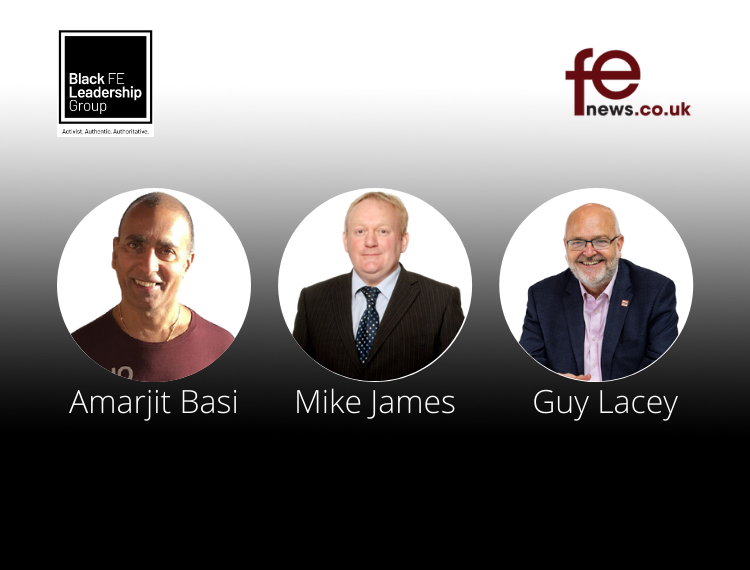#AntiRacismInAction : Wales | Episode 4

By the BFELG: #AntiRacismInAction: Wales with Dr Maxine Room CBE, Guy Lacey and Mike James
Aired today Monday 25th October, Episode 4 of 9 BFELG Livestreams #AntiRacismInAction – Making the Most of an Ethnically Diverse Britain, was co-produced by BFELG and FE News and co-anchored by Gavin O’Meara (CEO and Head of Digital, FE News), and Amarjit Basi, BFELG Executive Member.
The Episode, was introduced by Dr Maxine Room CBE -BFELG member and Founding Director of Medacril Associates Ltd, a training organisation . Maxine has extensive experience of leading colleges in both England and Wales. She spoke candidly about what #AntiRacismInAction means to her – recently finding her ‘voice’, the power of being able to tell her story and her journey, and how the more Black stories are told and understood, the better life would be for everyone.
With a focus on Wales, today’s episode is the first within the Livestream series to explore place-based, system leadership of #AntiRacismInAction.
There is no doubt that Wales is ‘leading the way’ in many aspects of tackling racism. According to the Office for National Statistics (ONS) based on population survey figures from 2019, people from ethnic minority backgrounds make up 14.4% of the United Kingdom. The population of Wales is about 3.1 million with a relatively small percentage – 5.6% of people – being Black, Asian and minority ethnic. And yet, the Welsh Government has a vision to become an anti-racist nation by 2030 and has published and recently consulted on (24 March to 15 July 2021) actions to create ’a proudly Anti Racist Wales’. The Race Equality Action Plan for Wales draws on lived experiences of racism and includes a set of deliverables to tackle racism and inequality across Government, ranging from education to health, housing to the economy. The Plan is bold and ambitious. Embedded within its values of an envisaged future is the statement: ‘We believe that by 2030 we should all be seen as “Welsh” with “the problem of racism, which leaves trauma that “affects mental health for years” no longer upon…our shoulders’.
Is it within the realms of possibility to see similar statements of intent by other UK nations? Can Black people and communities be seen as English, Irish or Scottish? Is this a desirable value to be espoused by #AntiRacismInAction?
Today’s Guests, Guy Lacey – Principal/Chief Executive, Coleg Gwent, and Mike James, Group Chief Executive, Cardiff and Vale College Group shared insights into the practicalities, challenges and opportunities of place-based leadership of Anti-racism in Wales. Both CEOs were early signatories to the BFELG ‘Open letter’.
Coleg Gwent and Cardiff and Vale College are the two largest FE colleges in Wales and both institutions have affiliated with the BFELG because this provides them access to a framework of support and services for deep cultural change – #AntiRacismInAction, using the BFELG 10 Point Plan Diagnostic Toolkit as a departure point.
Coleg Gwent, with campuses across five locations in South East Wales – City of Newport, Crosskeys, Torfaen Learning Zone, Usk and Blaenau Gwent Learning Zone in Ebbw Vale, offers full time, part time or university level qualifications across a wide range of academic and vocational subjects. It works in collaboration with employers in the local community.
Cardiff and Vale College Group delivers full-time and part-time college courses, university qualifications and apprenticeship programmes within the Capital Region of Wales, along with dedicated provision for employers.
Guests talked about the unique opportunities and challenges faced by Wales in respect of ethnic diversity, and the success factors in seeking to address these; their respective organisational responses to ethnic diversity, and the steps being taken to move forward on this agenda. They also touched on their roles as ‘custodians’ of the future legacy for their communities and shared their personal reflections on “place-based leadership” in seeking to harness a shared commitment towards Anti-racism.
A significant contribution to Anti-racism in Wales is the Ministerial Working Group Independent Review led by Professor Charlotte Williams OBE to advise the Welsh government on and improve on the teaching of themes and experiences relating to Black communities across all parts of the school curriculum. The Working Group’s ground-breaking report ‘Communities, contributions and cynefin: Black, Asian and Minority Ethnicities in the new Curriculum in Wales’ was published in March this year. The 51 recommendations in the report have been accepted by the Welsh Government (£500,000 will be provided to support the implementation of the report’s recommendations, as part of the delivery of the new Curriculum for Wales) and point to what could be achieved across the UK.
One cannot but compare and contrast the level of ambition, transformational approaches and tone of the Welsh Government’s review of the secondary curriculum and The Race Equality Action Plan for Wales, to that of the UK Government’s Independent Commission on Race & Ethnic Disparities which was set up in June 2020 following the Black Lives Matter protests. The Report of the Commission, published on March 31 2021 claims dismissively, without any evidence to back this up, that while there might be overt acts of racism in the UK, there is no institutional racism.
The work of the Commission is a missed opportunity to provide system leadership at a UK wide level, to face up to the issue of racial equity and justice that if not addressed would undoubtedly have negative long-term implications for UK society in general, and our future prosperity in particular.
Watch the Livestream to hear the Guests’ influencers and drivers for #AntiRacismInAction, the actions they are taking to inspire and involve all their constituencies at Board, management and individual level within their organisations their communities, their tips for other leaders, and their individual dream scenarios for Anti-racism.
Tune in on Monday 1 November at 9.30am for another place-based Episode – #AntiRacismInAction: West Yorkshire.
* ’Black’ is used as an inclusive definition to refer to people from ethnically diverse backgrounds who share a lived experience of the effects of racism.











Responses